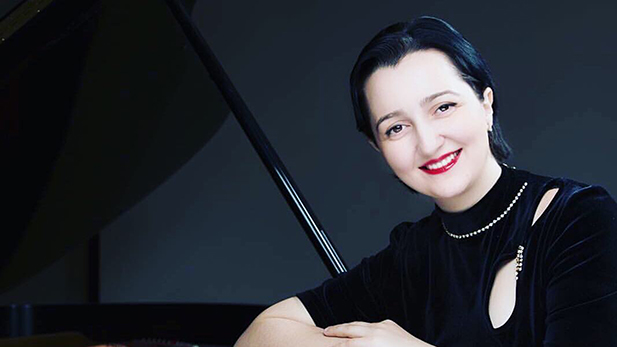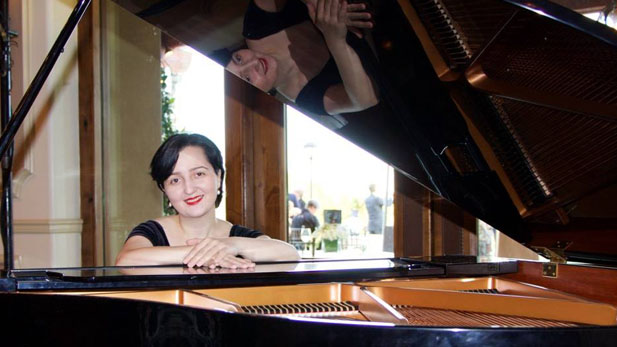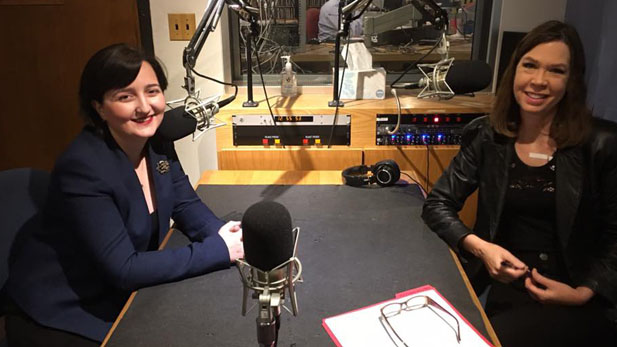 Classical pianist Nino Bakradze teaches and studies at the University of Arizona.
Classical pianist Nino Bakradze teaches and studies at the University of Arizona.Nino Bakradze was born into a family of musicians, but started relatively “late” in her musical career … not giving her first classical piano recital until the age of 9, in what was once the communist nation of Soviet Georgia. Since then, her talent has been noted in international competitions and piano recitals throughout Europe, Asia and the Americas.
After studying at prestigious conservatories in New England, Bakradze accepted an invitation to study and teach at the University of Arizona. Arizona Public Media caught up with the Georgian native following her recital tours in Spain and the Czech Republic.
Bakradze has many roles to play at the Fred Fox School of Music: international award-winning competitor, part-time teaching assistant and hardworking doctoral student. She is majoring in piano performance, studying under University of Arizona music professor Tannis Gibson, with a minor in orchestra conducting.
"I study, perform and compete at the same time," she said.
Q: Where are you from?
A: I’m from the Republic of Georgia. Tbslisi is the capital city. So I studied there, I earned my bachelor’s degree and master’s degree in Georgia, and only in 2011 I moved to the United States.
Q: It seems like Europeans in general have a lot of affection for classical music. Maybe even more so than the United States. Do you find that to be true?
A: Not exactly. Of course, they have traditions and quite a unique history, very old. Everything started there, of course.
But I think that right now, it’s a very good place to be – the United States. Because a lot of people came here to share their knowledge. In different times in world history, we know there were different [cultural] centers. Usually musicians were trying to move from their countries to the center – to just have an opportunity to perform, and write music or just to interact with interesting musicians and people. Right now I think one of the “centers” is the United States, so I’m very proud to be here.
 Pianist Nino Bakradze
Pianist Nino Bakradze
Q: Who are your favorite composers?
A: I love every one! Every composer that I play. I think that’s most important because in the process of working -- which is very complicated and hard -- you have to be engaged. Of course, mostly I think the romantic composers.
Q: Are there also certain emotions you feel from various composers?
A: It’s totally emotional. It’s impossible without emotions, and without nerves and nervousness and excitement. You have to be excited with what you’re doing. Of course you are, but at the same time, because I want to be as professional as everyone else, I am trying to go a little bit deeper than just to be emotional. It’s a thinking process and feeling, together.
You have to be excited with what you’re doing. Of course you are, but at the same time, because I want to be as professional as everyone else, I am trying to go a little bit deeper than just to be emotional.
Q: When did you decide you wanted to be a performer? Your parents are musicians, correct?
A: Yes. They spoiled me. I was a backstage child. I spent all my life in the backstage, so that was my wish: to finally to be alone on the stage. Just to enter and to receive my portion of applause. Of course, that sound and feeling -- it’s very magical in a way. That was the first time when I thought: I want to be a musician.
I was a backstage child. I spent all my life in the backstage, so that was my wish: to finally to be alone on the stage. Just to enter and to receive my portion of applause.
But as a pianist? After my first recital, I remember I said: I want to be a pianist. My parents had absolutely different plans about me. They were thinking that I might sing, because I was singing all my childhood. It’s common in Georgia to sing.
They had hope. But unfortunately, or fortunately, I found the piano the most independent instrument. I could keep it for a long time for myself. You can’t do it, if you are, for example, a classical dancer – with age, of course.
My favorite pianist is Vladimir Horowitz, and there are unique recordings of him when he was at the age of probably 80, and I thought “I also want to be like that!”
 Pianist Nino Bakradze being interviewed by Bryn Bailer in the AZPM radio studio.
Pianist Nino Bakradze being interviewed by Bryn Bailer in the AZPM radio studio.
Q: What do you think about when you are at the piano, and practicing?
A: Mostly of course, as a performer you try to read the manuscript well. That’s the most important part, I think: to understand what exactly the composer meant when he put some certain dynamics there, or tempo markings, or anything. Very small details can change many things during a performance or interpretation – then you're finding yourself in that music.
Q: How do you define yourself as an artist?
A: Oh, "artist" is a very loud word for me! I am searching. I’m wandering, I think. I am trying to find the ways to express myself, and I’m learning. I hope I will learn until the end of my life, and I will never stop that process. That will be a very nice thing to do.
In April, Bakradze will resume her touring schedule, with performances in the United States, as well as in Sweden, France, Italy and her home nation of Georgia.

By submitting your comments, you hereby give AZPM the right to post your comments and potentially use them in any other form of media operated by this institution.